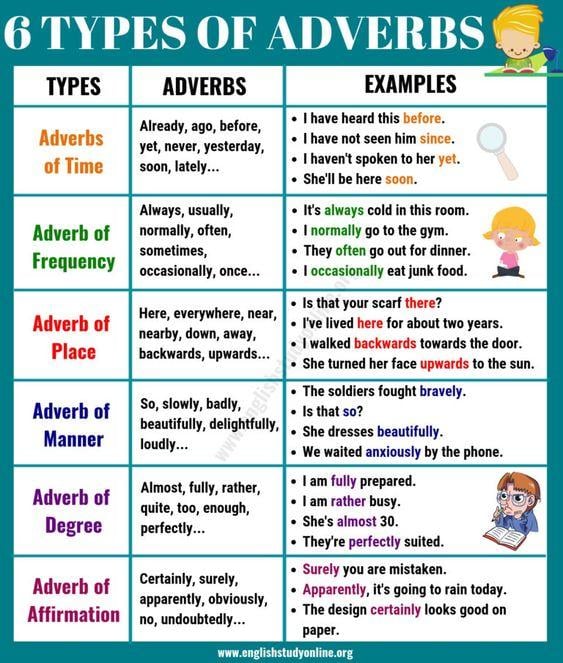Let's take a look at the six basic types of adverbs in English. Learn useful usage, example words, and example sentences of different adverbs types in English with this printable ESL infographic.

Basic Types of Adverbs
Adverbs of Time
Usage: Describes when or for how long a certain action happened.
Example words: Already, ago, before, yet, never, soon, yesterday, soon, lately
Example sentences:
- I have heard this story before.
- I have not seen him since last summer.
- He hasn’t spoken to her yet.
- He’ll be here soon.
- Lisa hasn’t been feeling so well lately.
- We’ve never been to Rio de Janeiro.
- We left the house over an hour ago.
Adverbs of Frequency
Usage: Describes how often something occurs, either indefinite or indefinite terms.
Example words: Always, usually, normally, often, sometimes, occasionally, once, seldom, rarely, never
Example sentences:
- It’s always hot in this room.
- I usually just have a banana for breakfast.
- I normally go to the gym in the morning.
- We often go out for dinner.
- Sometimes it’s best not to say a single word.
- I occasionally eat pizza.
- I seldom read autobiographies.
- He hardly ever drinks alcohol.
- I never go to the cinema on a Monday.
Adverbs of Place
Usage: Tells about where something happens or where something is.
Example words: Here, everywhere, near, nearby, down, away, backwards, upwards
Example sentences:
- There was an accident nearby.
- Is that your hat there?
- I’ve lived here for about two months.
- The sun’s going down and it’ll be dark soon.
- Ms Brown is away on vacation until the end of the week.
- I walked backwards towards the wall.
- He turned his face upwards to the sun.
Adverbs of Manner
Usage: Shows how or what way something happens or is done.
Example words: So, slowly, badly, beautifully, delightfully, loudly, anxiously
Example sentences:
- The soldiers fought bravely.
- Is that so?
- Could you please speak more slowly?
- She dresses beautifully.
- He has a delightfully dry sense of humour.
- We waited anxiously by the office.
- I thought he was treated very badly.
Adverbs of Degree
Usage: Shows how much, or in what degree or to what extent of qualities, properties, states, conditions and relations.
Example words: Almost, fully, rather, quite, too, enough, perfectly
Example sentences:
- He is fully prepared.
- She is rather busy.
- I'm almost 30.
- The two situations are quite different.
- It’s too hard to explain.
- Have you had enough (to eat)?
- They’re perfectly suited.
Adverbs of Affirmation and Negation
Usage: Answers that something is true or some equivalent negative statement.
Example words: Certainly, surely, apparently, obviously, no, undoubtedly
Example sentences:
- Surely you are mistaken.
- She is undoubtedly the best goalkeeper in the team.
- The design certainly looks good on paper.
- Apparently, it’s going to snow today.
- She was in tears and obviously very upset.
- It is undoubtedly one of the best songs of the year.
Are you interested in teaching English as a foreign language? Get your TEFL or TESOL certification with ITTT.
Register now & get certified to teach english abroad!


